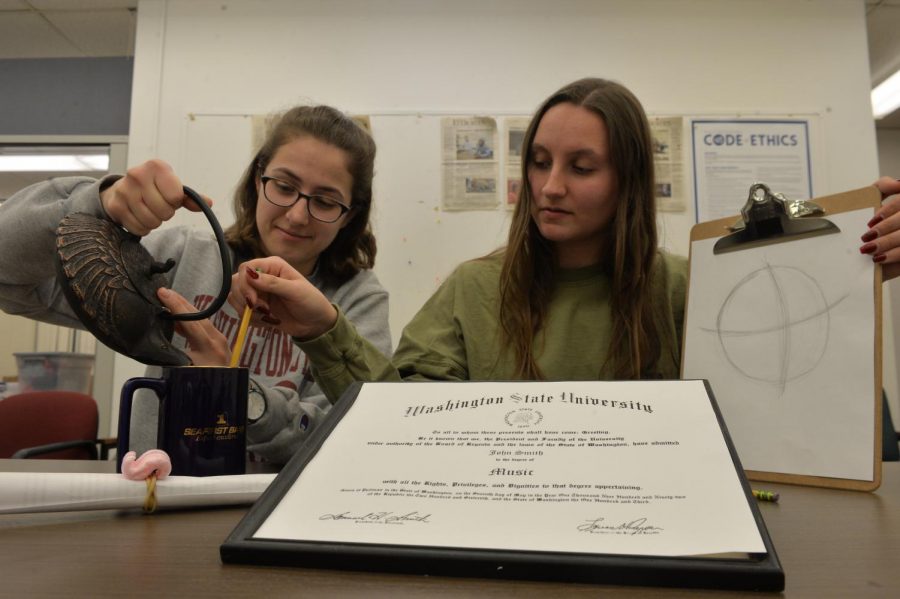Encourage major exploration, pursue passion
Many job opportunities after college look for skills developed in college over specific majors, students should study interests
BENJAMIN MICHAELIS | EVERGREEN PHOTO ILLUSTRATION
The STEM fields are a respected, well-recognized part of the WSU community, but there are other majors who deserve the limelight.
February 6, 2019
Many students know what it’s like to face scrutiny at family gatherings for the majors they’ve chosen.
Pre-med, engineering and other STEM majors are praised, while the likes of arts or language studies are bound to receive criticism.
Part of the problem is recognition. Scientists, doctors and teachers are all commonly acknowledged positions. It’s not a bad thing to major in one of these fields, but when people have a job that strays just outside of common knowledge, their function is questionable and isn’t as highly thought-of as a result.
It’s crazy to put anyone down for wanting a career they’re passionate about. Just because the roles these majors fill are less understood does not mean that they are any less valuable.
Our time at WSU is spent trying to prepare us for life after graduation. Whether that is grad school or straight into a job, it’s constantly stressful, even in a student’s first year. With majors like biology or education, it’s easier to know the path one is expected to take.
When someone chooses a different major, like fine arts or a kind of cultural studies, the student and others wonder what someone is supposed to do with it after college. But there are job opportunities available that many students haven’t even heard of, jobs they may be perfect for.
It is important to understand how college majors and the respective occupations interact. This is important for not only deciding on a major but also on a path beyond college.
Lee Tatum, a major exploration adviser at WSU, majored in German language and agrees with this concept.
“You never know how you are gonna get from A to Z and there are so many different ways,” Tatum said. “It’s the skills that employers are looking for and almost every major can help a student develop those skills.”
People who share a major still go into a wide variety of occupations. Even with an uncommon major, a degree of any kind can get you a job you wouldn’t receive otherwise. You could major in philosophy but work in the corporate world, and you could major in biology but end up in a museum, according to an analysis published by The Hamilton Project.
“When you’re looking at communication skills, critical thinking skills, which majors supply those … really, [it’s] most of them,” Tatum said.
You should stick to majoring in your passion because, in the end, you will end up with a job you are qualified for and will love.
We need not to disregard these majors. We should instead recognize them as we do others. These majors don’t have guaranteed jobs, but that doesn’t mean we don’t need these jobs to complete our society. It is our passions that make these careers possible, and no passion should be any less than another.
There should be more career fairs and club outreach at WSU so students can explore all paths and know what jobs are out there.
Spreading the word about all the different opportunities out there would help more students major in different things, helping them find a way to make their passion work.









Lee Tatum • Feb 6, 2019 at 3:17 pm
Thanks so much for your piece, Alivia! Since you mentioned the need for additional outreach, I wish I also had mentioned the “MEET YOUR MAJOR FAIR” my office, the Major Exploration Advising Program for exploring/undecided students, holds every Fall semester in the CUB.
It’s designed especially for first- and second-year students who are struggling to choose a major, or looking to change their major.
MEAP invites every department, program, and College at WSU to participate, and students trying to find the major that’s right for them can come to the MYMF and get valuable information. Students can talk with advisors & instructors about majors, minors, and resources (like the Pre-Law Resource Center, Health Professions Student Center, and much more) in an open, low-stress environment.
It’s a great chance to learn about the 200+ programs & degrees offered at WSU!
Our 3rd annual fair was this past October, and I’m sure we’ll host one next Fall. But in the meantime, if you’re undecided or you’re thinking about changing your major & you need some help, please email us ([email protected]) or contact us to set up an appointment with an Exploring academic advisor (509-335-8731). Thanks!